Lyra's Oxford
 You may recall Lyra from the His Dark Materials trilogy or from another post I made regarding the best female literature characters of all time. This small book is intended to be a small sequel to that series that marked my childhood so intensely. I greatly recommend HDM as a young-adult read, as well, for it tackles important subjects such as theology, ethics and alchemy. Moreover it explores the theory of parallel universes and fuses fantasy with science fiction in a mesmerizing way. So when I discovered the existence of this book, I impulsively started reading it. Of course, I didn't expect a proper sequel, but more of an exercise in marketing, which it proves to be. It contains a lot of drawings and scraps along the story, but the story itself is pretty basic. On the other hand, it makes sense as a sequel, because it revolves around the idea of "belonging", of "home", which is something that Lyra has lost along her journey in the previous series.
You may recall Lyra from the His Dark Materials trilogy or from another post I made regarding the best female literature characters of all time. This small book is intended to be a small sequel to that series that marked my childhood so intensely. I greatly recommend HDM as a young-adult read, as well, for it tackles important subjects such as theology, ethics and alchemy. Moreover it explores the theory of parallel universes and fuses fantasy with science fiction in a mesmerizing way. So when I discovered the existence of this book, I impulsively started reading it. Of course, I didn't expect a proper sequel, but more of an exercise in marketing, which it proves to be. It contains a lot of drawings and scraps along the story, but the story itself is pretty basic. On the other hand, it makes sense as a sequel, because it revolves around the idea of "belonging", of "home", which is something that Lyra has lost along her journey in the previous series.
Desespero
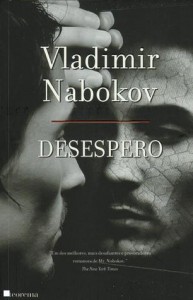 Despite the originality of an egotistical artistic assassin, moved by self-profit and self-adoration, I was a bit disappointed, the concept wasn't that much developed. On the other hand, the aesthetics of Nabokov's writing screams at you from every page, it's sharp-tongued, ironic, prone to a good laugh now and then, but sometimes I found it a bit pretentious. It's obvious that Hermann could only be properly depicted by such a style, but even so I couldn't completely enjoy such a reading.
Despite the originality of an egotistical artistic assassin, moved by self-profit and self-adoration, I was a bit disappointed, the concept wasn't that much developed. On the other hand, the aesthetics of Nabokov's writing screams at you from every page, it's sharp-tongued, ironic, prone to a good laugh now and then, but sometimes I found it a bit pretentious. It's obvious that Hermann could only be properly depicted by such a style, but even so I couldn't completely enjoy such a reading.
THE COLLECTOR ( Vintage Classics )
 Do you have that one friend that keeps more than one collection or when he or she is fed up with one, his or her mind has already irrevocably settled itself on another project? They might not even notice it, but… it’s happened again, he or she is keeping another one, just like one maintains air in its lungs. If that case applies to you… well, I wouldn’t advise you to read this, because you can get a seed for an idea for yet another “collection” and this one isn’t exactly legal. On the other hand, if you do have a friend like I’ve just described… this story will make you look differently towards that same person, it could be good or bad, but definitely different.An appallingly banal butterfly collector wins a lottery and sees himself freed from the constraint of his familiar bonds. Afterwards, he kidnaps a young neighbor he’s been observing for most of his life, an art student – Miranda.This book was hard to put down, it describes the imprisonment period in such a delicate way from the kidnaper’s point of view and then Miranda’s desperation tells a completely different story. The young woman dwelves into his mind and purposes deeper and deeper in order to regain her freedom, but solitude and stimuli deprivation take their toll on her, mesmerizing her into an abyss of hours, minutes, seconds. The beautiful way Fowles has of portraying each character and the polarizing way they deal with their emotions throughout their confinement together makes this a very peculiar (perhaps frightening for some other readers) read. I found Caliban a very interesting character, it was quite challenging to find “the human” in his distorted perception of life (and yet not so strange at times) and to see it through the eyes of a snob-ish full-of-life dreamer, whose wings are paralyzed by fear (and something more?).
Do you have that one friend that keeps more than one collection or when he or she is fed up with one, his or her mind has already irrevocably settled itself on another project? They might not even notice it, but… it’s happened again, he or she is keeping another one, just like one maintains air in its lungs. If that case applies to you… well, I wouldn’t advise you to read this, because you can get a seed for an idea for yet another “collection” and this one isn’t exactly legal. On the other hand, if you do have a friend like I’ve just described… this story will make you look differently towards that same person, it could be good or bad, but definitely different.An appallingly banal butterfly collector wins a lottery and sees himself freed from the constraint of his familiar bonds. Afterwards, he kidnaps a young neighbor he’s been observing for most of his life, an art student – Miranda.This book was hard to put down, it describes the imprisonment period in such a delicate way from the kidnaper’s point of view and then Miranda’s desperation tells a completely different story. The young woman dwelves into his mind and purposes deeper and deeper in order to regain her freedom, but solitude and stimuli deprivation take their toll on her, mesmerizing her into an abyss of hours, minutes, seconds. The beautiful way Fowles has of portraying each character and the polarizing way they deal with their emotions throughout their confinement together makes this a very peculiar (perhaps frightening for some other readers) read. I found Caliban a very interesting character, it was quite challenging to find “the human” in his distorted perception of life (and yet not so strange at times) and to see it through the eyes of a snob-ish full-of-life dreamer, whose wings are paralyzed by fear (and something more?).
A Um Deus Desconhecido
 An ode to Nature is probably the best description for this book. The title is taken from an adaptation of a hymn to the god Prajapati from the Hindu Rig-Veda. And while the hymn is innocuous enough, it really is a foreshadowing of what is to come. In To A God Unknown, practically from the first chapter, the mood is one of a foreboding, as Joseph Wayne takes leave of his father who blesses him in a vaguely described but clearly unusual way, deliberately meant to evoke Hebrew Testament patriarchs. From there on, the mood just intensifies, as Wayne finds land that is his so much so that there is a passage that can easily be interpreted as his copulation with the earth. The brothers come out to join Joseph in California, buy adjacent land, forming a big family, marking its history in the soil and thus owning the depth of the Earth it comprehends. One brother, Burton, is a fundamentalist Christian, and in his religious fanaticism lies the seed of this story.Intense dialogues, intriguing scenarios and disturbing as much as emotional outcomes, this isn’t exactly an easy read. But Nature herself – Steinbeck’s undoubtful muse - isn’t unchanging, pious or benevolent as much as we may adore her.
An ode to Nature is probably the best description for this book. The title is taken from an adaptation of a hymn to the god Prajapati from the Hindu Rig-Veda. And while the hymn is innocuous enough, it really is a foreshadowing of what is to come. In To A God Unknown, practically from the first chapter, the mood is one of a foreboding, as Joseph Wayne takes leave of his father who blesses him in a vaguely described but clearly unusual way, deliberately meant to evoke Hebrew Testament patriarchs. From there on, the mood just intensifies, as Wayne finds land that is his so much so that there is a passage that can easily be interpreted as his copulation with the earth. The brothers come out to join Joseph in California, buy adjacent land, forming a big family, marking its history in the soil and thus owning the depth of the Earth it comprehends. One brother, Burton, is a fundamentalist Christian, and in his religious fanaticism lies the seed of this story.Intense dialogues, intriguing scenarios and disturbing as much as emotional outcomes, this isn’t exactly an easy read. But Nature herself – Steinbeck’s undoubtful muse - isn’t unchanging, pious or benevolent as much as we may adore her.
A Rainha no Palácio das Correntes de Ar (Millennium, #3)
 Acerca da trilogia Millennium como um todo (e porque não pode ser considerada de outra forma), não é de todo admirável que esteja a ser explorada (pela segunda vez) na sétima arte ou que este policial/thriller esteja nas estantes de bestsellers um pouco por toda a Europa e EUA. Por alguns caracterizada como “chocante”, “intempestiva”, “viciante”, num ponto estamos todos de acordo: esta obra causa “comichão”. E desencadeia essa reacção porque é um relato extremamente real, verosímil, quiçá muitos de nós já se confrontaram com situações semelhantes e agora se interrogam se certas coincidências se tratarão mesmo disso… coincidências. Larsson tornou-se mediático por ter desenvolvido uma conspiração que poderia abalar os próprios alicerces da Suécia, mas, como Mikael Blomkvist ressalva num dos últimos capítulos da saga, não se trata de um livro sobre conspirações, mas sim sobre os crimes cometidos pelos homens contra as mulheres. De facto, o autor expõe toda uma rede de criminalidade de género capaz de fazer arrepiar os mais cépticos. E para esse efeito, apresenta-nos personagens excêntricas, cujo passado vai sendo vislumbrado, à medida que observamos a estruturação das suas personalidades. A personagem mais marcante –Lisbeth Salander- é precisamente fruto da violência e crueldade de uma rede criminal que vai sendo descoberta ao longo da série. Uma jovem hacker, excepcionalmente inteligente, mas socialmente inepta, que desde cedo foi institucionalizada e “amordaçada” por uma sociedade que não hesita em classificá-la como “doente” e “perigosa”. Curiosamente, esta personagem alia forças a um audaz jornalista, emocionalmente inconsequente, que se recusa desde logo a julgá-la por opiniões externas – Mikael Blomkvist. E estas são apenas duas das personagens desta trama, que desenvolvem relações muito pouco convencionais, com o objectivo último de expor a verdade e garantir a liberdade que nunca foi reconhecida a Lisbeth.É neste último ponto que se revela a veia jornalística de Stieg Larsson, a sua escrita consegue ser minuciosamente descritiva, não dá espaço à imaginação ou a quaisquer “pontas soltas”, o que o dá solidez a este tipo de obra e, ao mesmo tempo, nos deixa a nós, leitores, pendentes de cada frase.
Acerca da trilogia Millennium como um todo (e porque não pode ser considerada de outra forma), não é de todo admirável que esteja a ser explorada (pela segunda vez) na sétima arte ou que este policial/thriller esteja nas estantes de bestsellers um pouco por toda a Europa e EUA. Por alguns caracterizada como “chocante”, “intempestiva”, “viciante”, num ponto estamos todos de acordo: esta obra causa “comichão”. E desencadeia essa reacção porque é um relato extremamente real, verosímil, quiçá muitos de nós já se confrontaram com situações semelhantes e agora se interrogam se certas coincidências se tratarão mesmo disso… coincidências. Larsson tornou-se mediático por ter desenvolvido uma conspiração que poderia abalar os próprios alicerces da Suécia, mas, como Mikael Blomkvist ressalva num dos últimos capítulos da saga, não se trata de um livro sobre conspirações, mas sim sobre os crimes cometidos pelos homens contra as mulheres. De facto, o autor expõe toda uma rede de criminalidade de género capaz de fazer arrepiar os mais cépticos. E para esse efeito, apresenta-nos personagens excêntricas, cujo passado vai sendo vislumbrado, à medida que observamos a estruturação das suas personalidades. A personagem mais marcante –Lisbeth Salander- é precisamente fruto da violência e crueldade de uma rede criminal que vai sendo descoberta ao longo da série. Uma jovem hacker, excepcionalmente inteligente, mas socialmente inepta, que desde cedo foi institucionalizada e “amordaçada” por uma sociedade que não hesita em classificá-la como “doente” e “perigosa”. Curiosamente, esta personagem alia forças a um audaz jornalista, emocionalmente inconsequente, que se recusa desde logo a julgá-la por opiniões externas – Mikael Blomkvist. E estas são apenas duas das personagens desta trama, que desenvolvem relações muito pouco convencionais, com o objectivo último de expor a verdade e garantir a liberdade que nunca foi reconhecida a Lisbeth.É neste último ponto que se revela a veia jornalística de Stieg Larsson, a sua escrita consegue ser minuciosamente descritiva, não dá espaço à imaginação ou a quaisquer “pontas soltas”, o que o dá solidez a este tipo de obra e, ao mesmo tempo, nos deixa a nós, leitores, pendentes de cada frase.
A Rapariga dos Pés de Vidro
 This is the love story of a timid young photographer, who has spent his whole life hiding behind a lens with the excuse of his genetic heritage and a daring, lifeful young woman who is inexplicably turning into glass. And there is one of the main flaws of this book – despite the varied references to norse mythology, you can but infer the cause of her “disease”.Personally, I liked this book, the writing isn’t fantastic at all, but the way many torn-apart lives interweave and slowly unravel was well thought indeed, it keeps the reader at a good pace. I think the whole concept might have been explored more deeply, but the way it tackled sensitive subjects sometimes made up for it. It’s essentially a wake up call – to leave one’s comfort zone, to be able to dare, to let yourself fall in love and be hurt and pick up the shards over and over again, if necessary, because alternatively the glass might creep in and soon you’ll be paralyzed.“I should take a photo.' 'No. Just remember it, and us in it.”
This is the love story of a timid young photographer, who has spent his whole life hiding behind a lens with the excuse of his genetic heritage and a daring, lifeful young woman who is inexplicably turning into glass. And there is one of the main flaws of this book – despite the varied references to norse mythology, you can but infer the cause of her “disease”.Personally, I liked this book, the writing isn’t fantastic at all, but the way many torn-apart lives interweave and slowly unravel was well thought indeed, it keeps the reader at a good pace. I think the whole concept might have been explored more deeply, but the way it tackled sensitive subjects sometimes made up for it. It’s essentially a wake up call – to leave one’s comfort zone, to be able to dare, to let yourself fall in love and be hurt and pick up the shards over and over again, if necessary, because alternatively the glass might creep in and soon you’ll be paralyzed.“I should take a photo.' 'No. Just remember it, and us in it.”
Werther (Biblioteca Visão, #24)
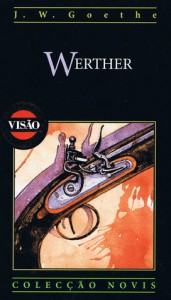 This was the romantic masterpiece of its time, definitely. It’s got every ingredient – drama, romance, tragedy – to blow up Germany’s rationalism. I can assure you, if it weren’t for the author’s capacity of portraying Werther, I wouldn’t be able to feel sorry for him. Most of the time, I felt like shaking him and beg him to wake up from that delusional slumber. It's only upon finishing that I realized how Goethe managed to draw me completely into the concerns and beliefs of one character in such an extraordinary way. Although his obsession lead to personal emptiness and thus destroyed him, I can only admit that lovers will always dwell on an uncertain path. And that’s just how a beautiful classic is written.
This was the romantic masterpiece of its time, definitely. It’s got every ingredient – drama, romance, tragedy – to blow up Germany’s rationalism. I can assure you, if it weren’t for the author’s capacity of portraying Werther, I wouldn’t be able to feel sorry for him. Most of the time, I felt like shaking him and beg him to wake up from that delusional slumber. It's only upon finishing that I realized how Goethe managed to draw me completely into the concerns and beliefs of one character in such an extraordinary way. Although his obsession lead to personal emptiness and thus destroyed him, I can only admit that lovers will always dwell on an uncertain path. And that’s just how a beautiful classic is written.
A Morte de Ivan Iliitch
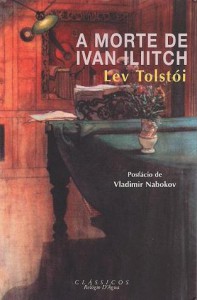 This is an ordinary story, it could be anyone’s really. Tolstoy masterfully narrates the life of a man that lives for appearances, for status, for his important work, for his fashionable house, for his mockery of a family, for a social life where everything is defined by what finer people decide is good or bad. As he ascends to what society considers best, his natural side gives in, and all his life is reigned by everything but genuine affection. It’s only when nature begins to abandon him - as an ignored old friend – that he clutches at every last sign of hope as his properly-built castle of cards quickly falls apart. It’s interesting that the only truly happy memory he possesses goes back to his childhood when life was still unmarred by common ambitions and the choking succession of affairs. At the end of it, it’s quite a relief to finish this long process of unmourned death which surprisingly hasn’t started with a diagnosis (not at all) but long before – when the child became a man.
This is an ordinary story, it could be anyone’s really. Tolstoy masterfully narrates the life of a man that lives for appearances, for status, for his important work, for his fashionable house, for his mockery of a family, for a social life where everything is defined by what finer people decide is good or bad. As he ascends to what society considers best, his natural side gives in, and all his life is reigned by everything but genuine affection. It’s only when nature begins to abandon him - as an ignored old friend – that he clutches at every last sign of hope as his properly-built castle of cards quickly falls apart. It’s interesting that the only truly happy memory he possesses goes back to his childhood when life was still unmarred by common ambitions and the choking succession of affairs. At the end of it, it’s quite a relief to finish this long process of unmourned death which surprisingly hasn’t started with a diagnosis (not at all) but long before – when the child became a man.
V for Vendetta
 A gripping tale of the blurred lines between ideological good and evil. I must say I watched the film before reading this and I think this is an important remark. I was expecting some more depth regarding the development of the main character – as to what killed a man and hatched a receptacle of ideals. This bit disappointed me a bit, for V is such an interesting non-character.Other aspect that keeps me from giving it a 5 star rate is that the novel is pretty one dimensional, which doesn’t make sense to me, regarding its heavy political content. There’s V, who comes to represent anarchy, and the British government, who represent fascism. The fascists are all deviant ghouls, and V's idealistic approach to anarchy is never questioned. Moreover, I suppose it's fine to say that eventually anarchy will sort itself out into the best possible government (or lack there of), but I'd hate to be the test group for this hypothesis. On the other side, the artwork is pretty raw, but it helped me focus on the impressive plot even more, so it’s both a positive and a negative point. I found the pacing quite good, the dialogues enticing, the connections between the different characters very well established, for a novel that insists on not giving any depth to any of them and thus making their ideals scream at you from every page.Anyway, this was doomed to become a classic for the timelessness of its message - If the government is the only one that's right, the people have no say. If the government is what controls the people, the people have to bend to their ruler's will. If we stop listening to all things, and only be fed the manufactured lies and falsehoods of a corrupt system, we will forever be blind to how things are. So it’s up to any of us to fight, with love and knowledge, never with hate or ignorance.With that, I bid you adieu.
A gripping tale of the blurred lines between ideological good and evil. I must say I watched the film before reading this and I think this is an important remark. I was expecting some more depth regarding the development of the main character – as to what killed a man and hatched a receptacle of ideals. This bit disappointed me a bit, for V is such an interesting non-character.Other aspect that keeps me from giving it a 5 star rate is that the novel is pretty one dimensional, which doesn’t make sense to me, regarding its heavy political content. There’s V, who comes to represent anarchy, and the British government, who represent fascism. The fascists are all deviant ghouls, and V's idealistic approach to anarchy is never questioned. Moreover, I suppose it's fine to say that eventually anarchy will sort itself out into the best possible government (or lack there of), but I'd hate to be the test group for this hypothesis. On the other side, the artwork is pretty raw, but it helped me focus on the impressive plot even more, so it’s both a positive and a negative point. I found the pacing quite good, the dialogues enticing, the connections between the different characters very well established, for a novel that insists on not giving any depth to any of them and thus making their ideals scream at you from every page.Anyway, this was doomed to become a classic for the timelessness of its message - If the government is the only one that's right, the people have no say. If the government is what controls the people, the people have to bend to their ruler's will. If we stop listening to all things, and only be fed the manufactured lies and falsehoods of a corrupt system, we will forever be blind to how things are. So it’s up to any of us to fight, with love and knowledge, never with hate or ignorance.With that, I bid you adieu.
O Príncipe (Portuguese Edition)
 I’m afraid this book woke up the little tyrant in me, OK, let’s face it… it’s been there all along, it just exposed it clearly. I mean, this book was supposed to machiavellian, right? Which in my dictionary meant pure evil, morally distorted… nothing even remotely similar to absolutely true. All in all, it surprised me. It’s not like Niccolò wasn’t a manipulative bastard (if you don’t mind me saying). Oh, he was, alright. But I find him honest and quite brilliant. This is a handbook for despots that clearly states that being nice, in politics, in war, in struggles for power, often ends with one person winning and the other person being in prison, disgraced, exiled, or dead (and yet, maybe not only in politics).Machiavelli understood this, and the product was this book. There is a damn good reason why so many people started calling him "the devil." Why the book was put on the Catholic Index of banned books. The book makes no promises about being nice or this or that. It delivers on what it promises - how a person can gain and acquire power and keep it, and the sometimes ruthless actions necessary to maintain it and protect one's own self. “it is much safer to be feared than loved because ...love is preserved by the link of obligation which, owing to the baseness of men, is broken at every opportunity for their advantage; but fear preserves you by a dread of punishment which never fails.”
I’m afraid this book woke up the little tyrant in me, OK, let’s face it… it’s been there all along, it just exposed it clearly. I mean, this book was supposed to machiavellian, right? Which in my dictionary meant pure evil, morally distorted… nothing even remotely similar to absolutely true. All in all, it surprised me. It’s not like Niccolò wasn’t a manipulative bastard (if you don’t mind me saying). Oh, he was, alright. But I find him honest and quite brilliant. This is a handbook for despots that clearly states that being nice, in politics, in war, in struggles for power, often ends with one person winning and the other person being in prison, disgraced, exiled, or dead (and yet, maybe not only in politics).Machiavelli understood this, and the product was this book. There is a damn good reason why so many people started calling him "the devil." Why the book was put on the Catholic Index of banned books. The book makes no promises about being nice or this or that. It delivers on what it promises - how a person can gain and acquire power and keep it, and the sometimes ruthless actions necessary to maintain it and protect one's own self. “it is much safer to be feared than loved because ...love is preserved by the link of obligation which, owing to the baseness of men, is broken at every opportunity for their advantage; but fear preserves you by a dread of punishment which never fails.”
Do Androids Dream of Electric Sheep?
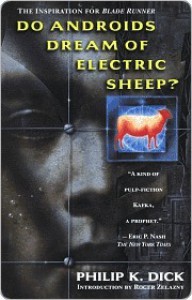 I must say I missed reading science-fiction… I’ve never been and assiduous reader of this genre, maybe because of the clichés it ends up developing or even because film productions filled my needs. But I can tell this was GOOD sci-fi, not only action-packed but one of the most credible – scientifically speaking – I’ve ever laid eyes on.By 2021, the World War had killed millions, driving entire species into extinction and sending mankind off-planet. Those who remained coveted any living creature, and for people who couldn't afford one, companies built incredibly realistic simulacrae: horses, birds, cats, sheep. . . They even built humans.It’s deliciously ironic… after human kind conquered technology, it feverishly tries to recover any life form, which was supposedly a given part of existence. The balance was ruptured and our best intelligence and investigation has led us inevitably to self-destruction.This narrative is centered on Rick Deckard’s moral dilemmas as a bounty hunter – he “retires” rogue androids. For example, on the differences between humans and human-like machinery, that resides on the empathy shown between human beings and animals but not to androids or amongst them. Is that the only difference between our brains? Would “andies” live long if they weren’t handicapped that way in terms of survival instincts? What’s the meaning of that form of life? Is it legitimate for us to “retire” them at all?
I must say I missed reading science-fiction… I’ve never been and assiduous reader of this genre, maybe because of the clichés it ends up developing or even because film productions filled my needs. But I can tell this was GOOD sci-fi, not only action-packed but one of the most credible – scientifically speaking – I’ve ever laid eyes on.By 2021, the World War had killed millions, driving entire species into extinction and sending mankind off-planet. Those who remained coveted any living creature, and for people who couldn't afford one, companies built incredibly realistic simulacrae: horses, birds, cats, sheep. . . They even built humans.It’s deliciously ironic… after human kind conquered technology, it feverishly tries to recover any life form, which was supposedly a given part of existence. The balance was ruptured and our best intelligence and investigation has led us inevitably to self-destruction.This narrative is centered on Rick Deckard’s moral dilemmas as a bounty hunter – he “retires” rogue androids. For example, on the differences between humans and human-like machinery, that resides on the empathy shown between human beings and animals but not to androids or amongst them. Is that the only difference between our brains? Would “andies” live long if they weren’t handicapped that way in terms of survival instincts? What’s the meaning of that form of life? Is it legitimate for us to “retire” them at all?
Witches, Midwives and Nurses: A History of Women Healers (Glass Mountain Pamphlets)
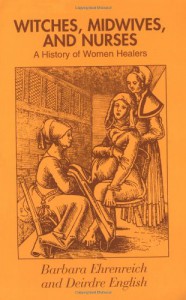 This was quite an interesting read for a non-feminist, 21st century medical student. From 1972, Barbara and Deirdre bring us an academic, synthesized approach to the History of female health professionals. It is quite obvious that women have always been the cornerstone of the medical arts, but for some obscure reason have never been regarded as so. In the dark ages, we called them witches, inferior to the rational knowledge of physicians and sought out feverishly, for even when their treatments were successful, the Malleus Maleficarum classified them as pure evil, thus protecting the medical class from any competition. In fact, what was labeled as superstitious was the basis of the empiric method we still use in some therapies; and what was called perverse might have been the first attempts at physical examinations, since the doctors even feared touching the patient for too long, dissecting was considered a crime and medical studies were dedicated to ancient history, astronomy and theology. Then it came the time for the midwives, restrained to child-bearing assistance, since too much knowledge was said to interfere with a woman’s fertility. And politics crept in to keep women from going to medical schools – the course was extended so that only the higher classes could afford to and younger women felt divided between starting a family or a career (this is where it starts sounding familiar). Moreover, even after graduating, women couldn’t perform as physicians since no hospital would take in a female intern.Finally, Florence Nightingale spreads nursing schools through the country, educating docile, submissive housemaids that History has baptized as the first nurses. Indeed, this was quite a surprise to me – for a woman that conquered so much, I didn’t expect Nightingale to be so determined to keep nurses as assisting maids, heeding to the doctor’s every order, with no scientific knowledge whatsoever. But certainly it was the beginning of a new era, nursing is now more than cleaning and feeding, it is a vast study. Presently, I can say medical schools are attended by more young women than men but I think such a long history of male supremacy in this profession has left its marks and they won’t fade for a long time.
This was quite an interesting read for a non-feminist, 21st century medical student. From 1972, Barbara and Deirdre bring us an academic, synthesized approach to the History of female health professionals. It is quite obvious that women have always been the cornerstone of the medical arts, but for some obscure reason have never been regarded as so. In the dark ages, we called them witches, inferior to the rational knowledge of physicians and sought out feverishly, for even when their treatments were successful, the Malleus Maleficarum classified them as pure evil, thus protecting the medical class from any competition. In fact, what was labeled as superstitious was the basis of the empiric method we still use in some therapies; and what was called perverse might have been the first attempts at physical examinations, since the doctors even feared touching the patient for too long, dissecting was considered a crime and medical studies were dedicated to ancient history, astronomy and theology. Then it came the time for the midwives, restrained to child-bearing assistance, since too much knowledge was said to interfere with a woman’s fertility. And politics crept in to keep women from going to medical schools – the course was extended so that only the higher classes could afford to and younger women felt divided between starting a family or a career (this is where it starts sounding familiar). Moreover, even after graduating, women couldn’t perform as physicians since no hospital would take in a female intern.Finally, Florence Nightingale spreads nursing schools through the country, educating docile, submissive housemaids that History has baptized as the first nurses. Indeed, this was quite a surprise to me – for a woman that conquered so much, I didn’t expect Nightingale to be so determined to keep nurses as assisting maids, heeding to the doctor’s every order, with no scientific knowledge whatsoever. But certainly it was the beginning of a new era, nursing is now more than cleaning and feeding, it is a vast study. Presently, I can say medical schools are attended by more young women than men but I think such a long history of male supremacy in this profession has left its marks and they won’t fade for a long time.
Justine
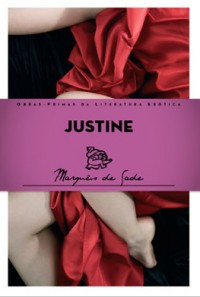 Two young sisters are separated and one is given the choice of living a life of sin and luxury, the other chooses to obey God and remain chaste. Everything bad that can happen happens to Justine, the pious sister and everything good that can happen happens to the sister who forsook God and embraced premarital sex, murder and sin. Well, so much for wondering about the origin of the term “sadism”. Sade certainly has such a way of describing sexual scenes that sometime made me look forward to the philosophical interludes he presents us; he was such a good writer that he made the reader linger on every juicy detail… until some get nauseous. It’s his peculiar way to give moral lessons… ok, this might sound contradictory, but it isn’t, not at all. Justine's attempts at reason towards her captors and their rebuttals and explanations were philosophical and demanding. This fascinated me at times, for it questioned concepts such as ‘virtue’ and ‘purpose’. I must say Sade was certainly a visionary, ironic, smart man and… probably the founder of pornography. Many people will disagree with me, but this novel is based too much on highly unlikely scenes that end up with highly predictable outcomes. Does that ring a bell to you? Well, that’s just why I couldn’t rate this novel with more than three stars. Moreover, the edition I own is embellished with some nice illustrations, accompanying the narrative.
Two young sisters are separated and one is given the choice of living a life of sin and luxury, the other chooses to obey God and remain chaste. Everything bad that can happen happens to Justine, the pious sister and everything good that can happen happens to the sister who forsook God and embraced premarital sex, murder and sin. Well, so much for wondering about the origin of the term “sadism”. Sade certainly has such a way of describing sexual scenes that sometime made me look forward to the philosophical interludes he presents us; he was such a good writer that he made the reader linger on every juicy detail… until some get nauseous. It’s his peculiar way to give moral lessons… ok, this might sound contradictory, but it isn’t, not at all. Justine's attempts at reason towards her captors and their rebuttals and explanations were philosophical and demanding. This fascinated me at times, for it questioned concepts such as ‘virtue’ and ‘purpose’. I must say Sade was certainly a visionary, ironic, smart man and… probably the founder of pornography. Many people will disagree with me, but this novel is based too much on highly unlikely scenes that end up with highly predictable outcomes. Does that ring a bell to you? Well, that’s just why I couldn’t rate this novel with more than three stars. Moreover, the edition I own is embellished with some nice illustrations, accompanying the narrative.
As Ondas (Colecção Mil Folhas, #17)
 O mar tem um efeito hipnotizante, quiçá sedativo, em mim. Poderia passar horas a contar as ondas, a inalar os seus aromas, a afogar-me nessas sensações a cada vaga. E é precisamente esse embalar que Virginia Woolf conseguiu captar e traduzir com tanta destreza nestas 224 páginas. Simplesmente sublime.A pena de Woolf traz-nos as vidas de seis amigos de infância, até ao finar das suas vidas. Algo que só seria feito com tanta maestria por alguém com capacidades de observação extremamente afinadas. “As Ondas” são os fios que os unem, que os indissociam e que, ao mesmo tempo e indelevelmente, os afastam em caminhos tão diferentes. Esta escrita tão criativa torna difícil discernir a personagem por detrás da fala, inicialmente, mas à medida que as ondas os afastam e cada um ganha protagonismo, as indicações tornam-se desnecessárias. Observamos uma caracterização tão precisa e distinta das personagens que nos interrogamos como acabam irrevogavelmente por convergir as suas existências numa só, numa partilha de medos, angústias e solidões. Uma narrativa quase etérea que se debate sobre a passagem do tempo, o sentido da existência humana, e, claro, a morte. Consegue ouvir as ondas?
O mar tem um efeito hipnotizante, quiçá sedativo, em mim. Poderia passar horas a contar as ondas, a inalar os seus aromas, a afogar-me nessas sensações a cada vaga. E é precisamente esse embalar que Virginia Woolf conseguiu captar e traduzir com tanta destreza nestas 224 páginas. Simplesmente sublime.A pena de Woolf traz-nos as vidas de seis amigos de infância, até ao finar das suas vidas. Algo que só seria feito com tanta maestria por alguém com capacidades de observação extremamente afinadas. “As Ondas” são os fios que os unem, que os indissociam e que, ao mesmo tempo e indelevelmente, os afastam em caminhos tão diferentes. Esta escrita tão criativa torna difícil discernir a personagem por detrás da fala, inicialmente, mas à medida que as ondas os afastam e cada um ganha protagonismo, as indicações tornam-se desnecessárias. Observamos uma caracterização tão precisa e distinta das personagens que nos interrogamos como acabam irrevogavelmente por convergir as suas existências numa só, numa partilha de medos, angústias e solidões. Uma narrativa quase etérea que se debate sobre a passagem do tempo, o sentido da existência humana, e, claro, a morte. Consegue ouvir as ondas?
Miss Peregrine's Home for Peculiar Children
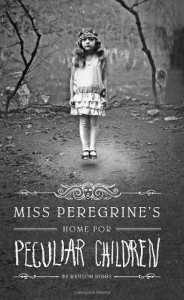 Do you remember when you were little and you sneaked up with your mates to the basement or the attic to share ghost stories or the most recent creepy local event? Or even when you had contests on what was the scariest tale? No? Well then, I’m very sorry for your childhood. I consider storytelling a basilar part of growing up and spooky narratives can obviously captivate a kid’s curious attention and scare the hell out of them, at the end, and maybe share a good laugh with his or her little friends. As a matter of fact, I don’t think it is healthy for a child not to wander in these darker realms but then again I’ve never been a usual child, but I digress…Don’t expect an entangled plot, adorned by a creative writing. Don’t expect psychological in-depth. Don’t expect horrid manipulated photographs. This is a story to be told from the kid who’s sneaking up inside us to a group of wide-eyed children, pending on every word we may utter. [If you’ve never experienced this, I greatly recommend it. I do hope I’ll get the chance to read this one aloud to an eager audience.]All in all, it can be a disappointing read when you’re not a child or a young adult or simply young at heart, but it was very well entangled with the photographs and turned out to be a pleasant book. Oh I almost forgot, I’ll leave you with a final thought - all of the photographs are vintage, authentic pieces, collected over the years by dedicated enthusiasts.
Do you remember when you were little and you sneaked up with your mates to the basement or the attic to share ghost stories or the most recent creepy local event? Or even when you had contests on what was the scariest tale? No? Well then, I’m very sorry for your childhood. I consider storytelling a basilar part of growing up and spooky narratives can obviously captivate a kid’s curious attention and scare the hell out of them, at the end, and maybe share a good laugh with his or her little friends. As a matter of fact, I don’t think it is healthy for a child not to wander in these darker realms but then again I’ve never been a usual child, but I digress…Don’t expect an entangled plot, adorned by a creative writing. Don’t expect psychological in-depth. Don’t expect horrid manipulated photographs. This is a story to be told from the kid who’s sneaking up inside us to a group of wide-eyed children, pending on every word we may utter. [If you’ve never experienced this, I greatly recommend it. I do hope I’ll get the chance to read this one aloud to an eager audience.]All in all, it can be a disappointing read when you’re not a child or a young adult or simply young at heart, but it was very well entangled with the photographs and turned out to be a pleasant book. Oh I almost forgot, I’ll leave you with a final thought - all of the photographs are vintage, authentic pieces, collected over the years by dedicated enthusiasts.
Balada da Praia dos Cães
 Em 1961 chegou às mãos de Cardoso Pires um relato de um homem que tinha sido acusado da co-autoria de um homicídio. Foi a partir desse relato e dos relatórios policiais referentes ao caso que idealizou este livro. O romance foi escrito no período pós-revolução de 25 de Abril de 1974. A acção situa-se no princípio dos anos 60, e retrata alguns aspectos da sociedade portuguesa em plena época da ditadura salazarista. A história começa com o relatório da descoberta de um cadáver enterrado na Praia do Mastro. Mais tarde, a polícia descobre tratar-se do major Luís Dantas Castro, um militar preso por tentativa de rebelião contra o regime vigente e que escapara da prisão.Esta leitura não se apresentou muito fácil, inicialmente. Parecia entrecortada por relatos e testemunhos e interrogatórios… o que só expôs ainda mais a nudez da realidade do Estado Novo. Acima de tudo, pude comprovar a destreza e precisão da escrita deste afamado autor contemporâneo.
Em 1961 chegou às mãos de Cardoso Pires um relato de um homem que tinha sido acusado da co-autoria de um homicídio. Foi a partir desse relato e dos relatórios policiais referentes ao caso que idealizou este livro. O romance foi escrito no período pós-revolução de 25 de Abril de 1974. A acção situa-se no princípio dos anos 60, e retrata alguns aspectos da sociedade portuguesa em plena época da ditadura salazarista. A história começa com o relatório da descoberta de um cadáver enterrado na Praia do Mastro. Mais tarde, a polícia descobre tratar-se do major Luís Dantas Castro, um militar preso por tentativa de rebelião contra o regime vigente e que escapara da prisão.Esta leitura não se apresentou muito fácil, inicialmente. Parecia entrecortada por relatos e testemunhos e interrogatórios… o que só expôs ainda mais a nudez da realidade do Estado Novo. Acima de tudo, pude comprovar a destreza e precisão da escrita deste afamado autor contemporâneo.



